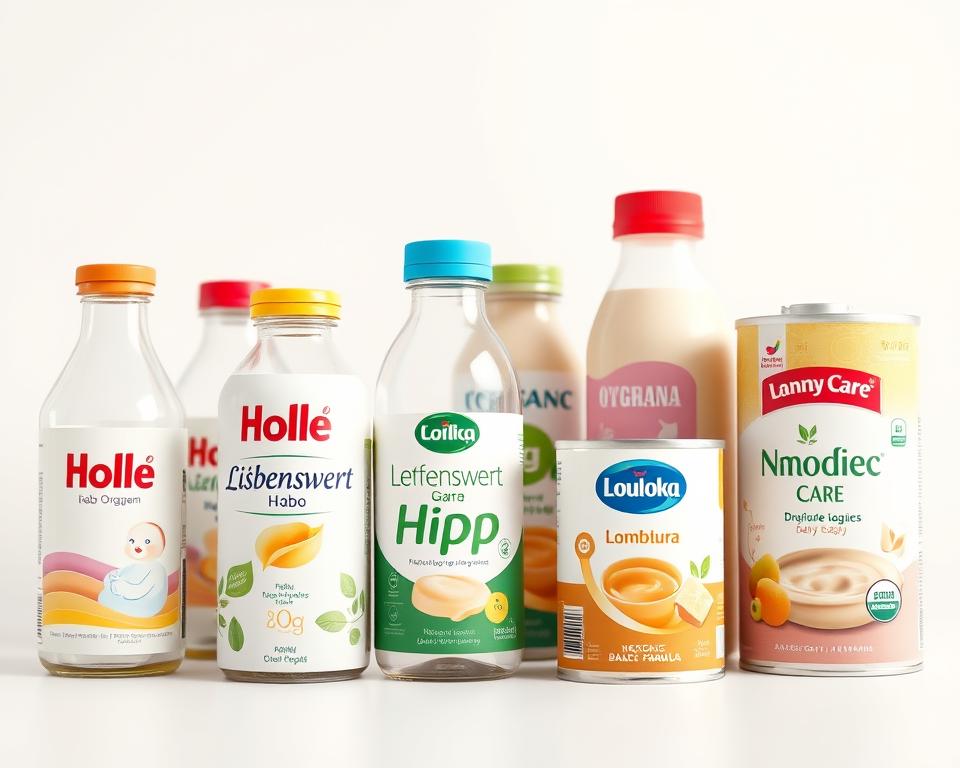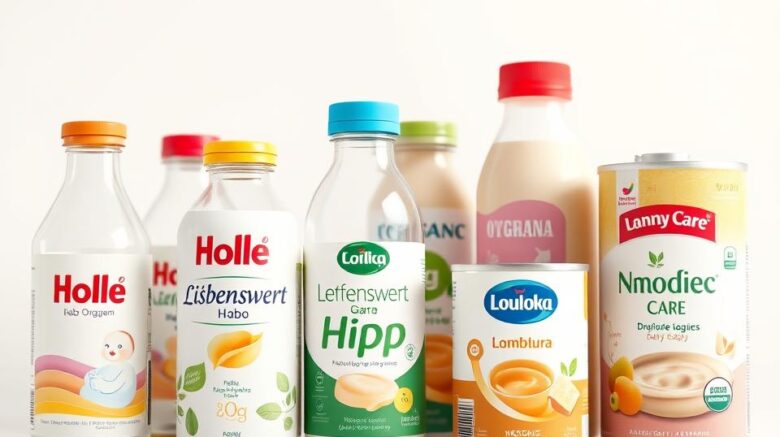Uncover the Best Organic Formula Options: Mom & Dad’s Manual
Almost eight in ten U.S. moms and dads rely on formula during their baby’s first year. This is often due to breastfeeding challenges. Picking the ideal baby’s organic formula matters greatly to these parents. Our handbook helps caregivers choose the optimum organic formula for their little ones.
Let’s explore different formulas by brand, highlighting quality and health. These insights are critical for a wholesome infant beginning.
Choosing the right food for your baby is a critical decision for every parent. Interest in organic-based baby formulas has risen sharply. It offers a cleaner feeding alternative. By excluding chemical residues, they ensure a safer early diet.
Parents are increasingly mindful of the absence of harmful chemicals like GMOs and artificial additives. Such concerns drive the trend toward organic as a safer nutritional path.
Benefits of Organic Ingredients
Organic ingredients in baby formulas offer significant benefits. They undergo strict testing for superior quality and protected safety. By opting for organic infant formula, parents can rest assured that their child is consuming food free from harmful substances.
The cultivation processes involved in organic farming emphasize sustainability and environmental preservation. This reinforces benefits that extend beyond dietary choices.
Related Developmental Gains
These formulas may foster healthier developmental results. Many studies suggest that babies receiving organic nutrition may exhibit fewer gastrointestinal issues and a lower likelihood of allergies. The absence of chemicals underpins these positive effects.
Caregivers appreciate the peace of mind from these well-rounded formulas. They bolster development and holistic infant health.

Top Qualities of Organic Infant Formulas
Picking the top organic formula plays a huge role in infant health. Examine both protein origins and vital micronutrients. How proteins are sourced and balanced impacts digestion and nourishment. Awareness of critical vitamins and fats secures optimal development and health.
Protein Sources and Ratios
Formulas typically blend whey with casein proteins. Whey is easier to digest, while casein provides a slow release of nutrients. A whey-lean blend suits delicate infant digestion. Many organic options boost whey content for digestive comfort. Look for formulas that clearly list their protein sources and have a balanced ratio for healthy growth.
Vital Additives and Health Boosters
Core vitamins and minerals matter for infant growth. Docosahexaenoic acid and arachidonic acid support neural and visual development. Including prebiotics helps establish gut flora and immunity. Look out for these components to secure complete nourishment. Organic formulas that focus on these nutrients offer a rich source of nutrition.
| Protein Source | Benefits | Whey-to-Casein Ratio |
|---|---|---|
| Whey | Easier digestibility|Gentle on tummies|Quick absorption | Higher ratio is better|Lean whey blend preferred|Above 60% ideal |
| Casein | Slow release of nutrients|Sustained nourishment|Stomach-friendly over time | Lower ratio preferred in early months|Casein kept minimal|Around 40% or less |
Popular Organic Baby Formula Brands
Moms and dads rely on established brands when buying organics. Below are notable labels and what makes them special. They lead the organic formula market, serving diverse dietary demands.
Kendamil: The Whole Milk Option
Kendamil is unique as the only organic baby formula made with whole milk. It offers a smooth mouthfeel without synthetic extras. Moms and dads choose it for its minimal processing and wholesome profile. Buying Kendamil online is straightforward and convenient.
HiPP’s Combiotik for Delicate Digestions
Designed to soothe, Combiotik suits babies with sensitive guts. Features both prebiotics and probiotics for digestive support. Families favor HiPP for its top-tier organics and trusted reputation.
Holle’s Biodynamic Organic Formula
Famed for biodynamic standards, Holle Bio ensures top-quality organics. Strict testing and eco-focused practices define its excellence. Caregivers opt for Holle because of its genuine flavor and nutrient profile.
Aussie Bubs: The Grass-Fed Option
Its grass-fed milk basis boosts vitamins and minerals naturally. All components reflect a back-to-nature approach. This distinct sourcing helps caregivers identify premium organics.
Bobbie’s Contemporary Organic Blend
Bobbie merges innovation and organic integrity for baby formulas. Balances modern nutrition science with certified organics. Parents value Bobbie’s nutritional approach as they navigate baby feeding.
Choosing the right organic formula for your baby requires careful thought about their dietary needs. Accounting for sensitivities ensures a comfortable feeding experience. Ingredients are critical, as they can greatly affect babies with sensitive stomachs.
Evaluating Food Sensitivities
Infants can respond poorly to lactose or intact proteins. Opt for specialized organic blends that address these issues. Sensitive blends reduce lactose or include pre-broken down proteins. These features aim to reduce irritation and aid in digestive health.
Seek medical advice to confirm the best feeding option.
Focusing on Tummy Comfort
Ease of digestion hinges on selecting a formula made for comfort. These compounds encourage a healthy microbiome and smoother digestion. By fostering beneficial bacteria, they enhance absorption and gut health.
Organic blends designed for breastfed infants deliver key components.
Guidelines for Formula Transition
Moving to organics from breast milk or conventional formula works best with steady changes. It’s important to understand how to transition your baby to formula for both your comfort and theirs. Slowly shifting ratios eases acceptance and prevents distress.
Steps for a Smooth Transition
Begin with small amounts of organics mixed in. Use this plan for the gentlest switch:
- Kick off by blending one part organic with three parts regular formula.
- Over the next week, gradually increase the proportion of organic formula while decreasing the traditional formula.
- If distress appears, reduce the organic increment and proceed more slowly.
- Offer the organic baby formula at controlled times during the day to help your baby associate it positively.
- Maintain regular feeding schedules to aid adaptation.
Indicators of Successful Switching
Spotting these indicators confirms a smooth adaptation:
- Baby nurses or bottles quietly and contentedly.
- Regular bowel movements and digestion remain consistent.
- No significant changes in appetite or feeding patterns.
- Infant seems satisfied and relaxed post-feeding.
Successful organic baby formula acceptance can take time, but these signs indicate a positive adjustment to the new nutrition.
Organic Baby Formula vs. Traditional Formula
Choosing between organic and standard formulas ranks high among parental dilemmas. Your choice shapes your infant’s nourishment quality. Concern over pure components and wellness perks drives the decision.
Composition Breakdown
The main difference between organic and traditional formulas is in their ingredients. They feature only certified organic elements, omitting artificial chemicals. Brands like HiPP and Kendamil use organic milk and other ingredients from sustainable farms. Conventional blends sometimes contain lab-made vitamins and non-certified ingredients. It underscores why organics champion pure, unprocessed feeding.
Price Considerations
Cost tends to be higher for organics due to rigorous sourcing requirements. Certification and sustainable farming drive up the price tag on organics. Despite the higher cost, many parents see the health benefits as worth the investment. Assessing cost versus benefit guides a balanced purchasing decision.
Digital retailers have transformed organic formula purchasing. Now, they can purchase top-notch formulas from home. Online options cover everything from hypoallergenic to grass-fed blends.
Online Retail Advantages
Digital purchases suit busy moms and dads. Easy ordering from any location.
- Convenience
- Endless formula choices online
- Competitive Pricing: Take advantage of promotions and discounted prices often available through online retailers
Formula Subscription Benefits
Scheduled formula deliveries are on the rise. Automated orders keep your formula supply constant.
Top subscription benefits are:
- Automatic Deliveries: Ensure a steady supply of formula without the hassle of reordering
- Customizable Frequency: Choose how often to receive deliveries based on your family’s needs
- Save money with recurring order deals
Regulations Governing Organic Infant Nutrition
Ensuring the safety and quality of organic baby formulas is a complex task. A web of rules ensures product safety and authenticity. FDA mandates safeguard formula nutrient profiles and hygiene. The USDA organic certification, on the other hand, verifies the authenticity of organic claims. Awareness of regulations boosts caregiver confidence.
FDA Oversight and Standards
The Food and Drug Administration sets essential formula rules. Their strict guidelines cover nutrient requirements and permissible ingredients. These mandates secure infant dietary adequacy. Key aspects include:
- Mandatory ingredient listings|Required ingredient disclosures|Compulsory component labeling
- Specific nutrient requirements such as protein, fats, and vitamins|Defined macro- and micronutrient thresholds|Preset nutrition minimums
- Comprehensive quality control measures during manufacturing|Rigorous production inspections|Stringent safety checks
Following these rules means infants receive only approved formulas.
USDA Organic Certification Guidelines
These certifications confirm true organic sourcing and handling. USDA checks confirm full adherence to organic protocols. Key criteria include:
- Proof that ingredients are produced without synthetic fertilizers or pesticides|No chemical fertilizers or sprays used|Farm inputs must be 100% natural
- Verification of non-GMO (genetically modified organism) status|Guarantee of GMO-free sourcing|Strict non-GMO testing
- Clear guidelines on the handling and processing of organic products|Protected organic integrity during production|Certified organic processing rules
USDA-approved organics guarantee farm-level purity. These standards deliver safer, nutrient-rich formulas. Together, these frameworks give caregivers full assurance.
| Regulatory Aspect | Description |
|---|---|
| FDA Regulations | Sets safety and nutrient standards for infant formula |
| USDA Organic Certification | Ensures organic ingredients are grown without harmful substances |
| Quality Control | Mandatory checks during production processes |
| Ingredient Transparency | Clear labeling of all components for consumer knowledge |
Buying Guide for Organic Formulas
Selecting the optimal organic formula might feel overwhelming. But with key tips, parents can confidently select the best option. Being aware of sources and certifications eases the purchase.
Where to Buy Organic Baby Formula Online
Many trusted online stores offer a broad range of organic baby formulas. These sites frequently run promotions. Consider these popular options:
- Amazon – Renowned for choice and quick dispatch
- Target – Features same-day delivery and curbside pickup
- Walmart – Provides both online shopping and local availability
- Thrive Market – Curates wellness-oriented selections
Always read customer reviews before buying. Use reviews to judge formula performance and vendor service.
Decoding Labels and Seals
Understanding labels and certifications is vital when buying organic baby formula. Seek official seals verifying organic compliance. Common ones include:
| Certification | Description |
|---|---|
| USDA Organic | Indicates the formula contains at least 95% organic ingredients |
| Non-GMO Project Verified | Means the formula does not use genetically modified organisms |
| European Union Organic | Denotes adherence to EU organic farming regulations |
Knowing these certifications ensures the formula is not only nutritious but also safe for your baby.
Final Thoughts
As we conclude this organic baby formula overview, it’s evident that selecting the right formula is critical for your baby’s health. Organic baby food offers more than just ingredients; it ensures your child’s overall well being. Your baby receives balanced nourishment free from chemicals. Caregivers now know to check protein ratios, sensitivity profiles, and top names like Kendamil and Holle.
This article highlighted the need for formulas that meet your baby’s specific needs. Transitioning to organic options should be a careful process. Incremental change safeguards digestive ease.
Guided by these pointers, you’ll choose with confidence from many choices. Opting for organic feeding fosters lifelong nutritional good habits. Keep championing top-tier infant nutrition. Ensure every tiny step toward solid foods starts with safe, wholesome options.
